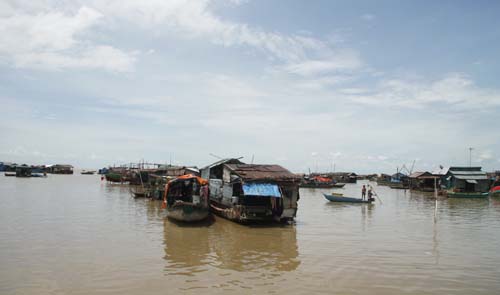It is not easy to break with the past and the emotions tied to a place where generations of one’s family were born.
It is for this reason that some ‘Tonle Sap inhabitants’ of Vietnamese origin return to Cambodia although they left it because of poverty and an indefinite future. With no land, belongings or residency registry, the people floating on the immense lake are stateless people, as they have no identification papers from either Cambodia or Vietnam.
As a result many of these people find themselves in a dilemma – they are motivated to return to their mother land in Vietnam while floating on the Tonle Sap, and then wish to return to Cambodia where they still have family members and are used to life.
Where to stay, Vietnam or Cambodia?
The Rach Vung village in Kan Dieng District, Pursat Province, Cambodia is the home of a number of Vietnamese Tonle Sap residents. Tuoi Tre met Mr. Nguyen Tanh, the father of Mr. Nguyen Van Nghi, who rowed three small fishing boats to take his 16-person family from Tonle Sap back to Vietnam months ago.
Tanh joined his son on the dangerous voyage but then returned to Cambodia. He did not come back because of his fishing business on Tonle Sap, but for his three other sons who still live in Cambodia. In addition, Tanh is part of the fourth generation of his family to live on Tonle Sap.
“I know it is not easy to survive here. But ten of my ancestors are buried here. I would feel pain if they had to lie there without incense smoke,” Tanh explained.
Mr. Tran Van Tai, another Tonle Sap resident from Kien Giang Province, said most of the villagers in Rach Vung have family ties between one another, and they have been living there for generations.
“I had plans to go back to Vietnam, but I cannot abandon my eight sons and daughters and 30 grandchildren here. So how can I tear myself away and leave?” asked Tai, who was born on Tonle Sap and has lived there for over 60 years.
He said thoughtfully, “I was born here and got used to life here. I have nothing after 60 years here, but I would also be returning home empty-handed. So, I will stay here till the end of this incarnation.”
Health is another issue that draws these people to Tonle Sap.
Those who are used to living on a boat for a long time may suffer muscle contractions if they begin living ashore. This can cause one’s back to curve and their legs to weaken, Tai added.
Tonle Sap fishing cost more expensive
Nguyen Viet Dat, vice chairman of the association of overseas Vietnamese in Krako District, Pursat, admitted that, “Fihsermen cannot make a living just by fishing on Tonle Sap.”
The number of fish caught is dropping ever year, but government fees and others costs to fish on the lake keep rising.
Each fishing boat with 100 meters of net on Tonle Sap is subject to ten different taxes and fees. On average, a boat owner pays a total of US$500 a year to fish on an area of Tonle Sap managed by a province, and US$3,000 to fish in five provinces.
Fishermen are also forced to pay unnamed fees which are not recorded on any bill or paper, according to Dat.
It is their poverty and statelessness that leaves these Tonle Sap residents living in permanent fear.
“The fishermen on Tonle Sap are scared when they see well-dressed people approaching them, as they could be local officials. Meeting them usually means receiving a fine, or confiscation of their net and boat, or other charges,” said Dat.

























































